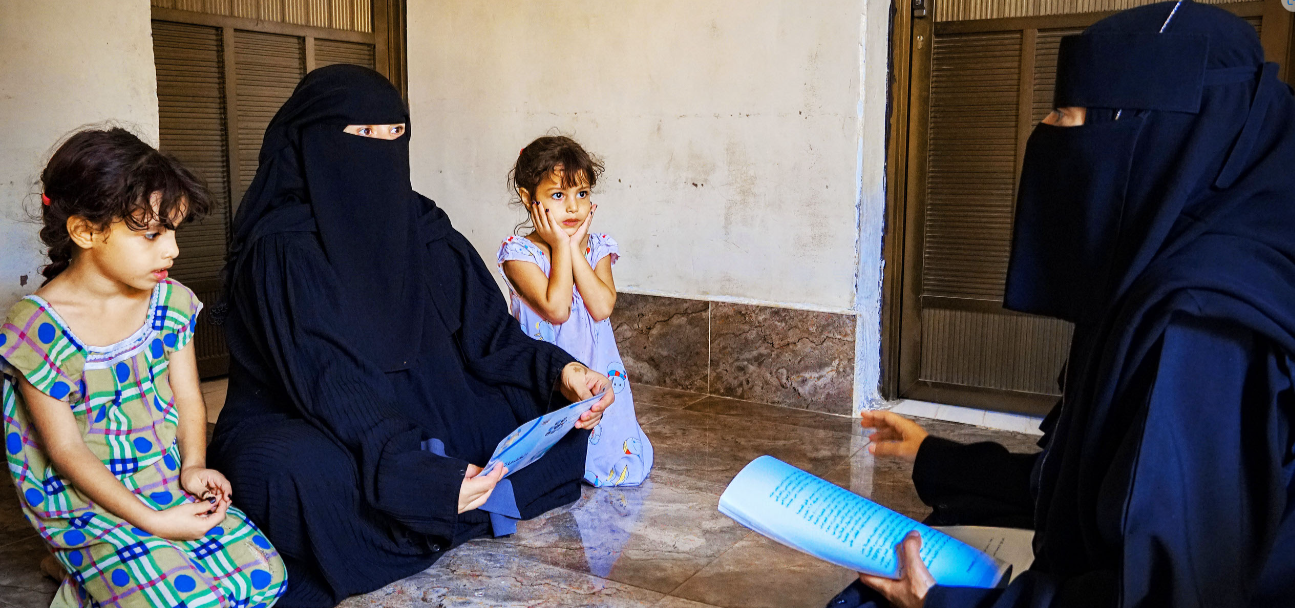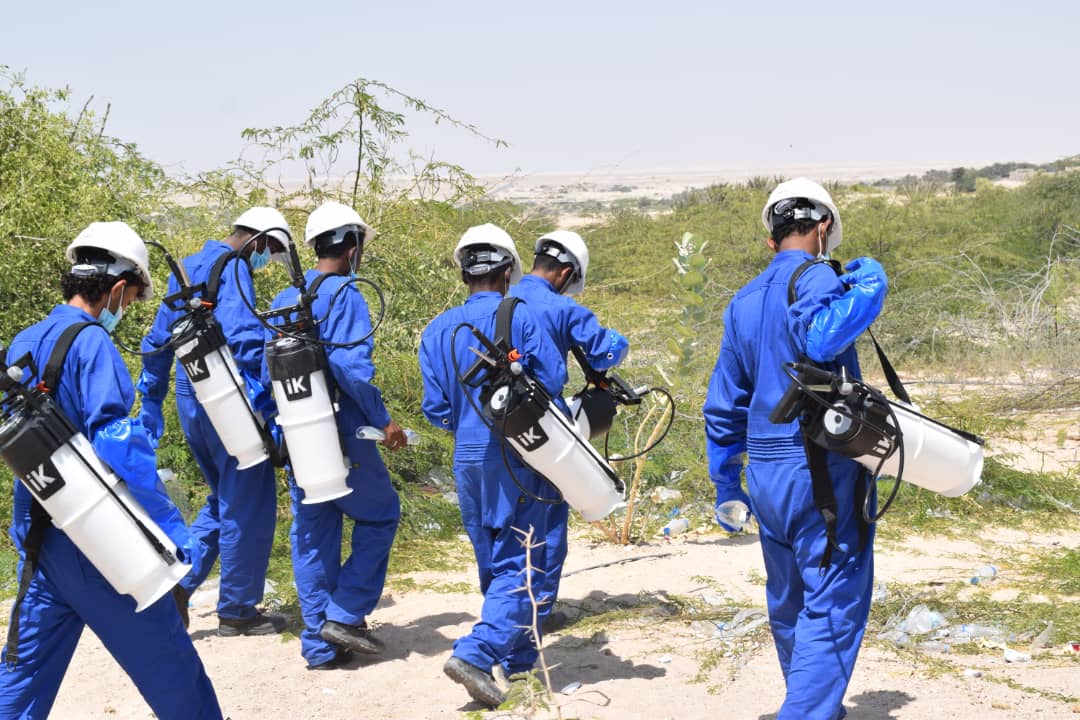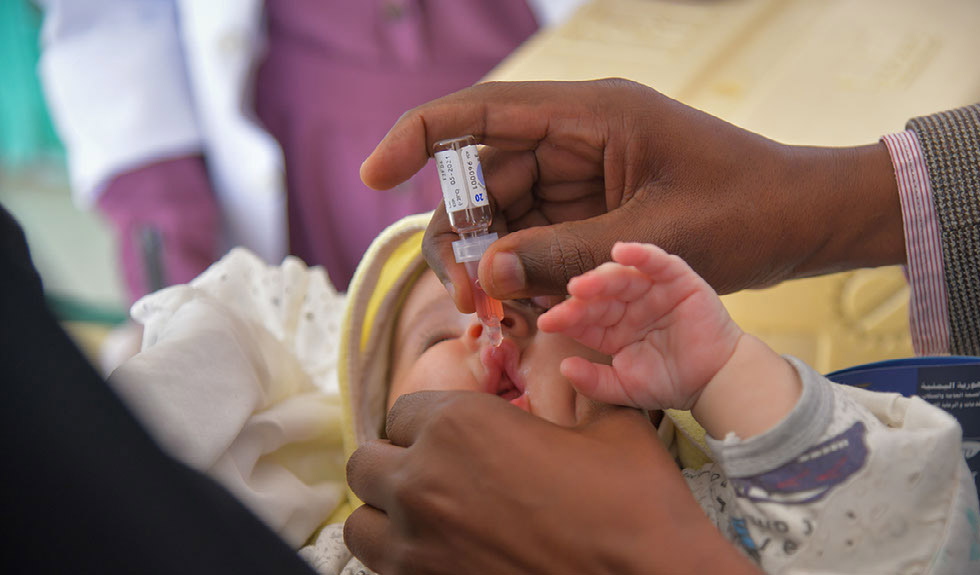Community health volunteers in Yemen: Empowering pregnant and nursing mothers to make best health choices

Across Yemen today, around 1.3 million pregnant or nursing mothers and 2.2 million children under age five require treatment for acute malnutrition. Health literacy is a critical tool for sustaining and saving their lives, especially when they are conflict-displaced and unable to access basic necessities like food, clean water, and primary health care.
The World Health Organization (WHO) in partnership with the King Salman Humanitarian Aid and Relief Centre (KSrelief) is supporting a refresher training for a network of 1,277 community health and nutrition volunteers to equip pregnant and breastfeeding women in 24 priority districts across 8 governorates with the right information to make the best health and nutrition choices they can for themselves and their infants, during and after their pregnancies.
Dhiya Saif, 28, is expecting her first child next month. She and her family were displaced by conflict five years ago, and now live in Aden, Yemen. The unaffordability of food, more than its availability, presents a major challenge for this family.
“There is a community health volunteer who has given me the information I have needed to improve my health awareness, and ensure my baby is well-nourished and in good health,” Dhiya says. “I am so much looking forward to giving birth – I cannot wait to hold my baby for the first time!”
Ensuring timely healthcare to improve dignified living conditions for the most vulnerable in Yemen
 1 May 2023 – In response to high levels of food insecurity and diminishing health services, WHO and UNOCHA have been working in coordination with health authorities to provide and improve dignified living conditions for the most vulnerable internally displaced persons (IDPs) in under-served IDP sites in Hudaydah, Marib, Taiz, Shabwah, Hadramout and Al Jawf governorates.
1 May 2023 – In response to high levels of food insecurity and diminishing health services, WHO and UNOCHA have been working in coordination with health authorities to provide and improve dignified living conditions for the most vulnerable internally displaced persons (IDPs) in under-served IDP sites in Hudaydah, Marib, Taiz, Shabwah, Hadramout and Al Jawf governorates.
In partnership with UNOCHA, WHO has supported 11 TFCs in conflict-affected areas where malnourished children under five years of age have been supported with nutrition and pediatric services. This programme of care includes provisions of essential medical and non-medical supplies, supporting health workers with incentive payments, and capacity building. During the lifetime of the project, a total of 10,141 children have been supported with nutrition and pediatric services, of which 33% are children from conflict-displaced and vulnerable families, with all families supported with transportation costs. In addition, 100 health care workers have received incentive payments, and 248 have received capacity building support.
Stopping malaria at the source

23 April 2023, Sana’a – More than 21 million people in Yemen are estimated to live in areas at risk of malaria, with more than 1 million malaria cases estimated to occur every year.
To curb the huge threat to health posed by the disease, WHO recommends indoor residual spraying (IRS) and use of insecticide-treated bed nets as core vector control interventions in malaria-endemic areas.
Before the campaign, detailed microplanning was conducted based on WHO criteria for IRS application. The majority of houses fitted the criteria and the vector was susceptible to the insecticides proposed to be used in the campaign.
The 54 districts were reclassified into 27 spraying regions based on geographical reconnaissance and geocoding. An additional 243 819 internally displaced people were covered in Abs district in Hajjah governorate during implementation of the campaign.
The campaign involved 1854 spraying workers, 473 spraying team leaders and 109 field supervisors. Around 500 female community health and education volunteers also participated in the campaign, with funding from other sources via WHO.
WHO will build on these results by assessing the climate-related risks of malaria and other climate-sensitive diseases, supporting the authorities to develop a national strategy for vector-borne diseases, producing rapid diagnostic tests and treatment supplies, and distributing insecticide-treated nets and conducting further campaigns as needed.
Vaccine-preventable diseases continue to spread in Yemen

Daunting challenges to immunization efforts are disproportionately affecting the youngest children
It’s not just polio. Against the backdrop of ongoing conflict, widespread malnutrition and shortages of food and medicine, one of Yemen’s fastest growing problems, is, ironically, easily solvable: multiple outbreaks of vaccine-preventable diseases.
The numbers are daunting. Yemen recorded more than 22,000 measles cases in 2022, including 161 deaths. In 2023 to date, cases have already spiked to 9,418, with 77 children dead. Diphtheria and pertussis – whooping cough – cases are also on the rise, as are deaths from each disease.


